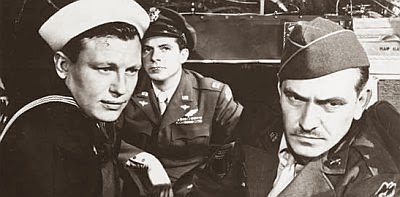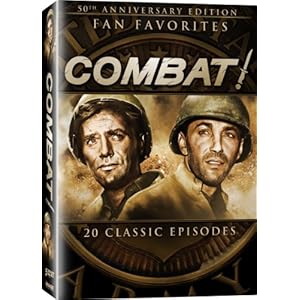Originally posted on 10/28/13
Like so many soldiers throughout the ages, returning World War II veterans were faced with a special dilemma--they were back in the homefront they'd yearned for, yet surrounded by people who had no idea what they'd just been through and what they were going through now.
The problems these men had fitting back into peacetime society--including becoming members of their own families again--are skillfully and sympathetically explored in director William Wyler's Oscar-winning masterwork THE BEST YEARS OF OUR LIVES (1946), now available on Blu-ray from Warner Home Video.
Three ex-servicemen--Army sergeant Al Stephenson (Frederic March, DR. JEKYLL AND MR. HYDE), Air Force captain Fred Derry (Dana Andrews, CURSE OF THE DEMON), and Navy swabbie Homer Parrish (Harold Russell)--hitch a long ride on a military transport to their hometown and become bosom buddies along the way.
We begin to feel their tension at seeing family and friends again as they liken it to "storming the beaches", with Homer especially dreading the impending reunion due to the loss of his hands during his ship's sinking. He fears not only how his folks will react but mostly whether or not his prospective bride, girl-next-door Wilma (Cathy O'Donnell, BEN HUR), will now reject him.
Fred has a different problem--his blond bombshell wife, Marie (a drop-dead gorgeous Virginia Mayo), to whom he had been married a mere twenty days before going overseas, is a party animal whose recent job in a nightclub has made her accustomed to a fast lifestyle which her unemployed husband can't provide.
The young Andrews is ideally cast as a once-proud soldier who now must return to his old job as a drugstore soda jerk, biting his lip as a former underling orders him around while an uncaring boss, as did many at the time, regards him and other returning vets as a nuisance to society. With Marie constantly berating him for not being successful or ambitious enough, and openly flaunting her intentions to "step out" on him, we can hardly blame Fred when he falls for Marie's exact opposite, the lovely and understanding Peggy (a vibrant Teresa Wright).
Trouble is, Peggy is Al's daughter, and he's having his own problems without having to worry about her hooking up with a married man. Unlike his two pals, former banker Al returns to a luxurious apartment but feels just as out-of-place among his wife and two kids. Their reunion is tense and uncomfortable--empathetic viewers, in fact, may feel this way for much of the film--with Al first glimpsing his wife Milly (Myrna Loy) across the expanse of a long hallway that symbolizes the gulf still lying between them. (He'll later describe the feeling of crossing that hallway as "like going overseas again.")
In the film's opening scenes, it's heartrending to see the near-desperation with which the three main characters cling to each other's sympathetic company rather than face the prospect of returning to the families who now seem almost like strangers to them. Later, we fear that they'll never reassimilate back into normal life.
This is especially true when restless Al urges Milly and Peggy to join him for a night out on the town. March, seemingly slipping into his celebrated Mr. Hyde persona at times, portrays Al as a manic, nearly out-of-control drunk on his first night back--it's almost as though he's decompressing, or trying to put on the brakes like a speeding jet landing on a runway.
It makes us glad that Milly is such a strong, sensible, supportive wife, with a rock-solid Myrna Loy (THE THIN MAN) lending her the stature of a woman any man would fight to come back home to and be glad to have on his side. With her help, Al will eventually "mature" into a self-assured, no-nonsense personality whose unshakable principles threaten to get him into hot water back at the bank when he starts granting loans to other veterans with little or no collateral. His drinking is another concern, as is the growing rift between him and Fred over daughter Peggy.
Even though we know Fred's marriage to Marie hasn't much of a future, his impulsiveness worries us when he steals a kiss from Peggy after an innocent lunch date. Her growing attraction to him draws her into a terrible quandary which puts her at odds with her parents, and the scene of their most emotional confrontation is powerfully done.
Meanwhile, Fred's feelings of worthlessness are dramatically illustrated when he visits a "graveyard" for derelict bomber planes that are to be junked. Sitting in the nose of a rusty, engineless plane and reliving his experiences as a bombadier, he realizes that he, too, is a wartime relic to be either recycled or tossed on the junk heap. Director Wyler renders the sequence with exquisite skill, while Andrews gives it his all and musical composer Hugo Friedhofer pulls out all the stops--it's a gripping scene.
Still, this is nothing compared to the emotional rollercoaster in store for the viewer regarding the unfortunate sailor, Homer. Portrayed by real-life amputee Harold Russell, himself a former serviceman who won the Best Supporting Actor Oscar for his debut role, Homer endures excruciating emotional torment which we can't help but share as he feels isolated amidst his own family and impotent as a man.
During a scene in which he silently allows his father to remove his "arms" and dress him in his pajamas--in what was certainly a reflection of his own real-life experiences-- Russell's face and demeanor tell us everything we need to know about the thoughts and emotions roiling inside him. When he angrily thrusts his hooks through a windowpane in response to the curious looks of his little sister and her friends, it's a shocking and disturbing moment in cinema.
Russell gives an earnest, painfully uninhibited performance that lends added dimension to what is already a devastatingly effective and multi-faceted story. Andrews has probably never been better, nor has Teresa Wright, with their final scene together delivering a substantial payoff for the film as a whole.
March and Loy, the two old pros, come through like gangbusters as a couple whose problems only seem to make them stronger as long if they face them together. And in a role that displayed her dramatic talent at a time when she was known mostly for comedy, Virginia Mayo proves that she's not only a knockout but can deliver a raucous, punchy performance (her "mirror" scene with Wright dazzles, as do her frenetic exchanges with Andrews.) Also in the cast are stalwarts such as Hoagy Carmichael, Ray Collins, Steve Cochran (as Marie's oily-haired new beau), Don Beddoe, and Gladys George.
The single-disc Blu-ray from Warner Home Video is in 1.77:1 widescreen and English 1.0 sound. Subtitles are in English, French, and Spanish. Bonus features consist of a brief introduction by Virginia Mayo, interview footage with Mayo and Teresa Wright, and the theatrical trailer.
After THE BEST YEARS OF OUR LIVES has already put us through the wringer with its other stories of desperation and redemption, it saves its deepest felt and most lasting impact for the final scenes between Harold Russell's "Homer" and girl-next-door Wilma (Cathy O'Donnell is sweetness incarnate in the role) finally resolving the long-running uncertainty that has lingered between them since his return. It's one of the most heartrendingly emotional sequences I've ever seen, and if you can get through it without blubbering like a baby, then, as Kipling once said, "You're a better man than I am, Gunga Din!"

















